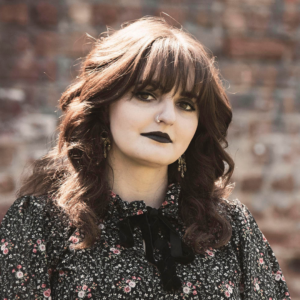A Point of Pride: Interview with Briana Morgan

 Briana Morgan (she/her) a queer, disabled horror author and playwright. Her books include The Reyes Incident, Mouth Full of Ashes, The Tricker-Treater and Other Stories, Unboxed: A Play, and more. She’s also a member of the Horror Writers Association. When not writing, you can find her watching horror movies, reading disturbing books, or playing video games.
Briana Morgan (she/her) a queer, disabled horror author and playwright. Her books include The Reyes Incident, Mouth Full of Ashes, The Tricker-Treater and Other Stories, Unboxed: A Play, and more. She’s also a member of the Horror Writers Association. When not writing, you can find her watching horror movies, reading disturbing books, or playing video games.
What inspired you to start writing?
My grandfather was a storyteller. Whenever he visited us, he’d tell my brother and me all kinds of stories—some recounted from legends and family history, but most of them made-up off the top of his head.
He also instilled a love for storytelling in my father, who wasn’t a writer, but would write and illustrate short children’s stories for us. I have fond memories of both men reading to me. I came to view writing as a way to bond with them through a shared interest. That, combined with my early love of reading, led to me creating my first stories.
What was it about the horror genre that drew you to it?
Psychology and human behavior have always fascinated me. Horror allows me to not only safely explore the darker sides of human nature but also understand what motivates fear, anger, violence, and other complicated emotional states.
Do you make a conscious effort to include LGBTQ material in your writing and if so, what do you want to portray?
I didn’t used to, but I do now. I want to show that queer people are just people. They have the same wants and desires as their non-queer counterparts. I want to normalize queerness in our heteronormative society.
What has writing horror taught you about the world and yourself?
Writing horror has taught me that you never know how you’ll react to a situation until you’re in it. You can anticipate and prepare, but that doesn’t take the place of real-world (or story-world) experience.
As I’ve grown as a writer, I’ve also leaned into social commentary through horror. It’s a great vehicle for examining institutions and traditions that no longer serve our modern worldview.
How have you seen the horror genre change over the years? And how do you think it will continue to evolve?
There used to be so much talk about “elevated” horror. A lot more people looked down on the genre. Now, though, I think horror is starting to get the recognition it deserves. I only think it will become more popular in the years to come.
How do you feel the LGBTQ community has been represented thus far in the genre and what hopes do you have for representation in the genre going forward?
For a long time, it felt like the most prevalent queer horror narratives were written and created by non-queer people. Marginalized voices have been suppressed and silenced throughout history, even in the horror space. I’m glad that seems to be changing. I hope that someday, we won’t even need to label queer horror as queer—it will simply be part of the canon.
Who are some of your favorite LGBTQ characters in horror?
Jennifer Check from Jennifer’s Body, Frank N Furter from The Rocky Horror Picture Show, Alice from Alice Isn’t Dead, and Yaya Betancourt from Queen of Teeth.
Who are some LGBTQ horror authors you recommend our audience check out?
I love Hailey Piper, Eric LaRocca, Joe Koch, Clive Barker, and Samantha Kolesnik, to name a few.
What is one piece of advice you would give horror authors today?
Take the tropes you love and twist them.
And to the LGBTQ writers out there who are just getting started, what advice would you give them?
Don’t let anyone else tell you what you can’t do. You define your own limits.



